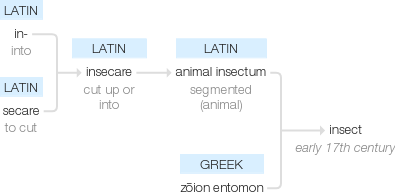Insect
early 17th century (originally denoting any small cold-blooded creature with a segmented body): from Latin (animal) insectum ‘segmented (animal)’ (translating Greek zōion entomon ), from insecare ‘cut up or into’, from in- ‘into’ + secare ‘to cut’.
wiktionary
From Middle French insecte, from Latin īnsectum(“with a notched or divided body, cut up”), from perfect passive participle of īnsecō(“I cut into, I cut up”), from in- + secō(“I cut”), from the notion that the insect's body is "cut into" three sections. Calque of Ancient Greek ἔντομον(éntomon, “insect”), from ἔντομος(éntomos, “cut into pieces”).
etymonline
insect (n.)
c. 1600, from Latin (animal) insectum "(animal) with a notched or divided body," literally "cut into," noun use of neuter past participle of insectare "to cut into, to cut up," from in- "into" (from PIE root *en "in") + secare "to cut" (from PIE root *sek- "to cut").
The Latin word is Pliny's loan-translation of Greek entomon "insect" (see entomology), which was Aristotle's term for this class of life, in reference to their "notched" bodies. First in English in 1601 in Holland's translation of Pliny. In zoology, in reference to a class of animals, 1753. Translations of Aristotle's term also form the usual word for "insect" in Welsh (trychfil, from trychu "cut" + mil "animal"), Serbo-Croatian (zareznik, from rezati "cut"), Russian (nasekomoe, from sekat "cut"), etc. Insectarian "one who eats insects" is attested from 1893.
Among the adjectival forms that have been tried in English (and mostly rejected by disuse) are insectile (1620s), insectic (1767), insective (1834), insectual (1849), insectine (1853), insecty (1859), insectan (1888).
